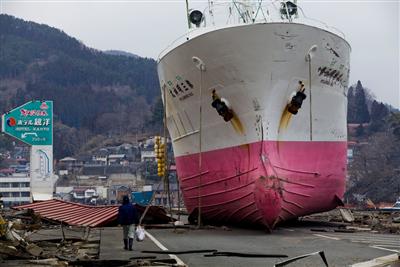 Nobody could fail to be aware of the disaster in Japan. On 11 March 2011, the land of the rising sun was hit by a magnitude 9 earthquake and several after-shocks leading to a devastating tsunami.
Nobody could fail to be aware of the disaster in Japan. On 11 March 2011, the land of the rising sun was hit by a magnitude 9 earthquake and several after-shocks leading to a devastating tsunami.
There was significant loss of life and property: entire cities and their infrastructures have been destroyed, thousands of people have been reported missing and a nuclear threat looms over the entire country. (Photo: Shiho Fukada for the International Herald Tribune)
However, international aid is already on its way, as there is an urgent need for help. France in particular sent one thousand first-aid workers, including a contingent of firefighters from the South of France, with a view to helping the Japanese forces locate people and provide support.
With clearing, nuclear safety, care, medical assistance and resupplying, there is much to manage, coordinate and plan between the local teams and NGOs providing assistance. Communication is crucial to coordinating operations. Volunteers from across the world are heading to the archipelago to help. To optimise efforts, everybody must understand each other and understand the needs of the Japanese people.
You have undoubtedly heard of Médecins Sans Frontières and Reporters Sans Frontières, but have you ever heard of Traducteurs Sans Frontières? Translation and interpreting services are crucial for NGOs. For instance, Traducteurs Sans Frontières helps Médecins Sans Frontières, Unicef, Médecins du Monde and Secours Populaire by translating emergency plans, development programmes, etc., free of charge or at a very low cost.
Currently in Japan, the Japan Association of Translators is publishing a list of volunteer Japanese translators and interpreters on its website, who are willing to help implement rescue teams and NGO initiatives. Some off-site volunteers translate administrative documents, others interpret remotely or have travelled to the disaster areas to help rescue teams.
We contacted some of these translation professionals to gain an insight into their activities. One of the people we contacted is a Japanese-French and Japanese-English interpreter. He set off on a voluntary assignment to Sendai on the east coast of Japan to provide field support to emergency services. His efforts will significantly ease communication between the local people and the French forces.
Several other translators and interpreters got in touch with us, despite being busy. Some of them have yet to start their assignment, or cannot travel for the time being. For instance, Mikako Miyahara, whose agency – known as Peacelink – is based in Hiroshima, had already been contacted twice by the American media, who require the services of a translator/interpreter in Tokyo. However, transport difficulties have made it difficult to travel to places quickly.
We shall keep in touch with these interpreters over the coming weeks and let you know about their activities. If this kind volunteering interests you, you can join this group on Facebook, or sign up on the Traducteurs Sans Frontières website.
Lastly, if you have been involved in voluntary translation/interpretation assignments for NGOs, let us know and we will pass on the information.
If you require any translation or interpreting services, especially in Japanese, please do not hesitate to contact us.


